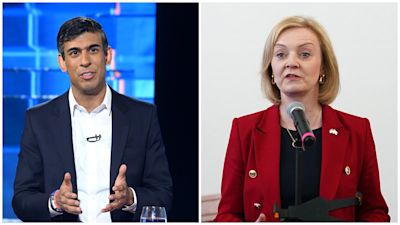Which PM candidate can grasp the cost-of-living crisis? There are big difficulties for both

Rishi Sunak wants to be the sensible candidate when it comes to public money, the one who doesn't opt for "something for nothing" economics, and who says he will not indulge in "fairy tales".
But the problem is - we are in the middle of a cost-of-living crisis, that has seen everyone squeezed, and during times like this, voters quite like the idea of fairy tales.
And so, just like when he was chancellor, and he had to come back after his Spring statement with a bigger support package for the Autumn and Winter - he is under pressure to deliver more now.
And as this is a Conservative leadership race - the "voters" in this situation particularly like the sound of tax cuts.
Sunak's plan to cut VAT from energy bills for a year is not insignificant - saving families £154 and costing £4.3bn.
It is a U-turn when you consider his comments to Parliament in February - that this very policy would disproportionately benefit the wealthiest, and that companies may not pass the money on to consumers. (His team argue that he was always in favour of some universal offers - which inevitably also help the richest - but only because they come on top of a much bigger targeted package that he has unveiled since February.)
But it isn't necessarily inconsistent with his concerns about inflation.
This policy obviously brings prices down in one way, and although it increases disposable income it's not by much.
A £4.3bn giveaway is nothing like the £30bn plus giveaway being prepared by Liz Truss.
But before I come to that, let me pause on the problem with Sunak's plan - and that is the question of whether it can stay temporary - as he's suggesting, and only last one year.
He himself argued during that same debate in February that would be difficult - if not impossible saying : "We should be honest with ourselves: this would become a permanent government subsidy on everyone's bills; a permanent subsidy worth £2.5 billion every year, at a time when we are trying to rebuild public finances."
Want a quick and expert briefing on the biggest news stories? Listen to our latest podcasts to find out What You Need To Know
Although he did reverse one policy - the universal credit uplift - he realised how painful it was. So will VAT on energy bills - and fuel duty (which he cut by 5p) really go up next year?
If it doesn't then an economist at the Institute for Fiscal Studies - Stuart Adam - thinks there is a problem, arguing that in the longer run, the policy would be bad for public finances and for the environment and net zero (because it would encourage more energy use).
The other thing that is bound to happen is that Sunak will come under massive pressure to repeat his multi-billion pound winter offering because next year, bills will still be terribly high and terribly painful.
As for Truss's plans - it is obviously true that big tax cuts (like not going ahead with the NICs rise) will ease the pain, particularly for those on middle incomes. But millions earn below that threshold. So they gain nothing from these expensive tax cuts - and yet, are the most vulnerable.
Secondly is the fact that a £30bn plus pound cuts are inevitably more inflationary than £4.3bn and so - as Stuart Adam points out - they will probably result in higher interest rates (good perhaps for pensioners with paid-off mortgages and savings of whom there maybe a high number among Tory members, but terrible for many others!).
But beyond interest rates, which have been much discussed, is the other inevitable outcome, that Adam points to. If you want far less tax, and a smaller state, that inevitably means spending cuts.
Which means ultimately - both candidates are offering policies that could ultimately result in the feeling of austerity.
And at a time of a cost-of-living crisis when the NHS feels close to breaking point - what exactly would you choose to cut?